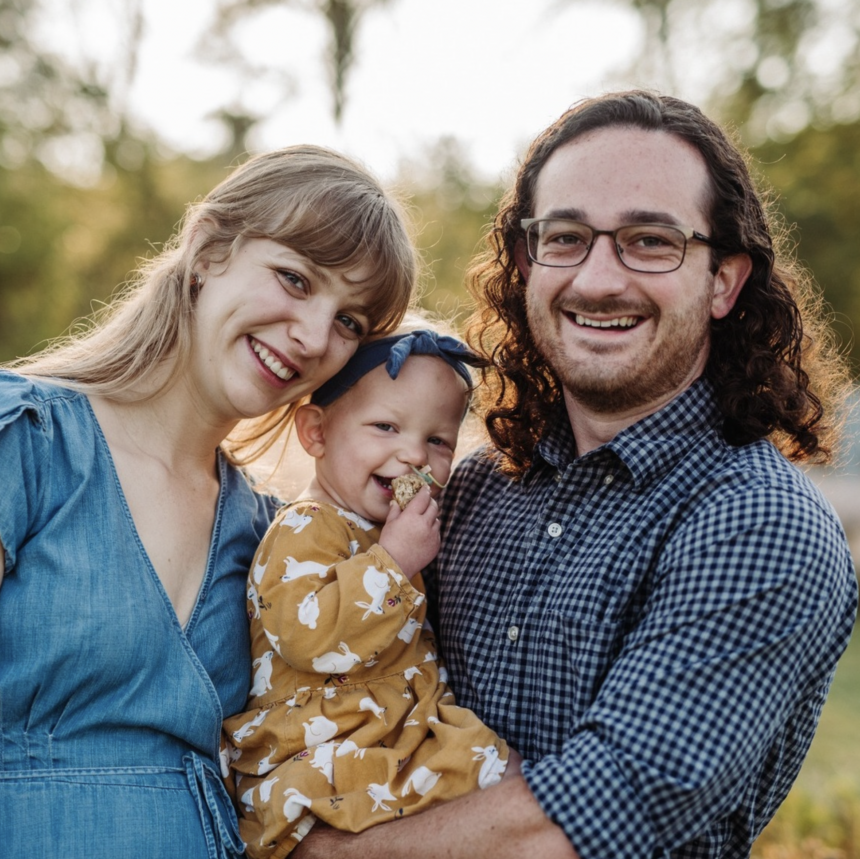Joshua Paladino and his family. Courtesy | Facebook
Because the scientific revolution changed the definition of nature, C.S. Lewis believed the natural law does not necessarily follow from nature, according to Van Andel Graduate School of Statesmanship student Joshua Paladino.
Paladino presented his dissertation “The Political Theology of C.S. Lewis” on March 27 in Lane 124.
Paladino earned his undergraduate degree from Hillsdale in 2018. He was opinions editor for The Collegian during his senior year. He also serves on Hillsdale’s city council.
“Lewis has a whole section on the word ‘nature,’ and he talks about how in the medieval world the idea of nature was more of an all-encompassing word of the whole system of reality,” Paladino said. “So the supernatural and the natural would be part of this system of nature, but he says that in the modern world we’ve moved from this conception of nature.”
This new understanding of nature, according to Lewis, is nothing more than material reality, Paladino said.
Using quotes from Lewis’ book “Miracles,” Paladino asserted rational thought is outside the modern understanding of nature.
“Reason is coming from another plane to give us guidance about how to order this world of chaos,” Paladino said. “In a way, you could say that there is a law proper to nature but it doesn’t come from nature. God tells us how to use nature.”
When we think about political theology, we usually think of a radical reliance on the Scriptures, but Lewis never does this, according to Paladino.
“His idea is that reason is the divine mind coming down to grace us with knowledge of morality,” Paladino said. “And it’s more than knowledge of morality. Reason is coming in for the laws of logic, the law of contradiction, the law of the excluded middle, geometry, algebra. All of the first perceptions that are necessary for the sciences to even begin come from outside the realm of nature.”
Paladino said, for Lewis, politics is about God revealing truth to human reason.
“Nature cannot give us values,” Paladino said. “We bring the values into it.”
Lewis always subordinates the preservation of the species — a tenet of the natural law — to the understanding that man is a certain type of creature, a creature that still is capable of friendship, freedom, dignity, and mercy.
“This is where you get the radical turn in Lewis’ thought,” Paladino said. “If we are not that type of creature, it is better that we not exist.”
Chair of the politics department and Paladino’s first dissertation reader John Grant introduced Paladino, praising the work he had done on his dissertation.
“Josh has this capacious knowledge of C.S. Lewis, more than any I’ve ever met,” Grant said.
Graduate student Josh Waechter said that Paladino’s presentation was the best he had heard during his time at the graduate school.
“He did the difficult work of weaving together Lewis’ thoughts about a number of key political issues from across his public works and private letters,” Waechter said. “With this dissertation, Dr. Paladino has clearly established himself as the leading Lewis scholar to be in permanent residence on Hillsdale’s campus. I’m, of course, excepting our distinguished visiting professor, Dr. Michael Ward.”
Waechter said that Paladino did a good job properly explaining political theology.
“Put simply, political theology is a lot more sophisticated an idea than simply seeing what the Bible or a bunch of pastors say about human politics,” Waechter said. “I think a lot of online commentators on this subject — especially those keen to argue for or against Christian nationalism — could learn a lot from Lewis.”
![]()

